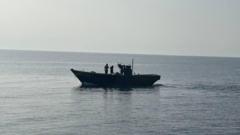Why Did Seoul Return Six North Koreans Eager to Go Home?

Understanding the Repatriation of North Koreans: A Complex Inter-Korean Dynamic
In a significant yet complicated development in inter-Korean relations, South Korea has repatriated six North Koreans who inadvertently drifted into its waters earlier this year. This event has brought to light the ongoing challenges and nuances within the relationship between the two Koreas. The repatriation marks a notable moment under the presidency of Lee Jae-myung, who has advocated for improved ties with the North. This article delves into the implications of the repatriation, the historical context, and the current state of inter-Korean relations.
The Background of Repatriation
Repatriation cases between North and South Korea have a long history, often shrouded in political tension and humanitarian concerns. The six North Koreans in question had consistently expressed their desire to return home, with two having drifted into South Korean waters in March and remaining there for four months—the longest duration for non-defectors. The other four individuals were sailors who crossed a disputed maritime boundary in May. These repatriations are not merely administrative decisions; they embody the larger narrative of inter-Korean relations, marked by fluctuating trust, communication breakdowns, and the overarching influence of political leadership.
The Role of Communication Breakdown
The complexities surrounding this repatriation are amplified by the breakdown of communication channels between the two Koreas. In April 2023, North Korea severed all lines of communication, which had previously facilitated dialogue on such matters. This decision came amid rising tensions, with North Korean leader Kim Jong Un even declaring that unification with the South was no longer feasible. As a result, the only communication avenues available are through the United Nations Command and media outlets, making coordination for such repatriations challenging.
Historical Precedents of Repatriation
Historically, there have been multiple instances of North Koreans unintentionally drifting into South Korean waters. Often, these individuals use small wooden boats that lack the ability to navigate effectively once they are adrift. In previous cases, authorities from both nations would work together to return those who wished to go back to North Korea via land borders. However, the recent escalation in hostilities has complicated these processes significantly.
The Political Landscape
Lee Jae-myung's election as South Korea's president in June 2023 marked a shift in approach towards North Korea. His pro-engagement stance contrasts with the previous administration's more hardline policies. Under Lee’s leadership, South Korea's military has taken steps to reduce provocations, including suspending loudspeaker broadcasts across the border. This move aims to rebuild trust and improve inter-Korean relations. However, some analysts remain skeptical about the potential for meaningful engagement, citing North Korea's growing ties with Russia and the prevailing public sentiment in South Korea against engagement.
The Mechanics of the Recent Repatriation
Despite the lack of direct communication, the recent repatriation has raised questions about the underlying agreements between the two nations. Observers noted the presence of North Korean patrol vessels and fishing boats at the handover point, suggesting that some form of behind-the-scenes negotiation had occurred. This indicates that despite the official rhetoric of isolation and hostility, both sides may be willing to engage in discreet dialogues when necessary.
Interrogation and Propaganda Post-Repatriation
Upon their return to North Korea, the six individuals are likely to face intense scrutiny. Experts suggest that they will be interrogated to determine if they received any espionage training or overheard sensitive information during their time in South Korea. This process is expected to be rigorous, aiming to extract valuable intelligence that can be used by the North Korean regime. Following the interrogation, the individuals may be utilized for propaganda purposes, reinforcing the regime's narrative and legitimacy.
Activist Perspectives and Humanitarian Concerns
The repatriation has drawn criticism from activists and defectors who believe that these individuals should have been given the opportunity to learn more about South Korean society before returning. Activist Lee Min-bok has voiced concerns that the six North Koreans could face punishment simply for having experienced life in the South. This highlights a broader humanitarian issue surrounding the treatment of defectors and the lack of support systems for those who inadvertently cross borders.
Shifting Public Sentiment in South Korea
As South Korea’s political landscape evolves, public sentiment towards engagement with North Korea appears to be shifting. While some segments of the population support increased dialogue and cooperation, others remain wary due to North Korea's aggressive posturing and human rights abuses. This dichotomy complicates the government's approach to inter-Korean relations, as public opinion can significantly influence policy decisions.
The Future of Inter-Korean Relations
Looking ahead, the relationship between North and South Korea is fraught with uncertainty. While President Lee Jae-myung has expressed intentions to foster dialogue, the reality on the ground suggests that substantial improvement in relations may remain elusive. North Korea's growing alliances with other nations, particularly Russia, have provided it with alternative avenues for support, diminishing its reliance on South Korea.
Potential for Future Engagement
Despite these challenges, there remains a glimmer of hope for future engagement. The desire for peace and stability on the Korean Peninsula is a common goal that could serve as a foundation for dialogue. However, both sides will need to navigate the complex political landscape carefully, balancing internal pressures with the necessity of cooperation.
Conclusion
The repatriation of the six North Koreans underscores the intricate web of inter-Korean relations, characterized by a mix of humanitarian concerns, political maneuvering, and historical precedents. As both nations continue to grapple with their complicated histories, the path forward will require patience, understanding, and a commitment to dialogue. The potential for reconciliation exists, but it will depend on both sides' willingness to engage constructively and address the underlying issues that have long divided them.
FAQs
What led to the repatriation of the six North Koreans?
The six North Koreans were repatriated after drifting into South Korean waters and expressing a desire to return home. Their case highlights the complexities of inter-Korean relations amid political tensions.
How does the communication breakdown between North and South Korea affect repatriations?
The severance of communication channels complicates the process of repatriation, making coordination difficult. However, there may still be behind-the-scenes negotiations that facilitate these actions.
What happens to North Koreans who are repatriated?
Upon returning to North Korea, repatriated individuals typically undergo interrogation to extract information about their experiences in South Korea, and they may be used for propaganda purposes by the regime.
Are there humanitarian concerns regarding the repatriation process?
Yes, many activists and defectors argue that individuals repatriated to North Korea should be given a chance to learn about South Korean society, as they may face punishment for their experiences in the South.
What is the future outlook for inter-Korean relations?
The future of inter-Korean relations remains uncertain, with some analysts predicting continued tension due to North Korea's alliances and public sentiment in South Korea against engagement.
The dynamics of inter-Korean relations continue to evolve, marked by complex historical narratives and current political realities. As the situation unfolds, what future developments do you foresee on the Korean Peninsula? #InterKoreanRelations #NorthKorea #SouthKorea
Published: 2025-07-09 06:30:12 | Category: world



